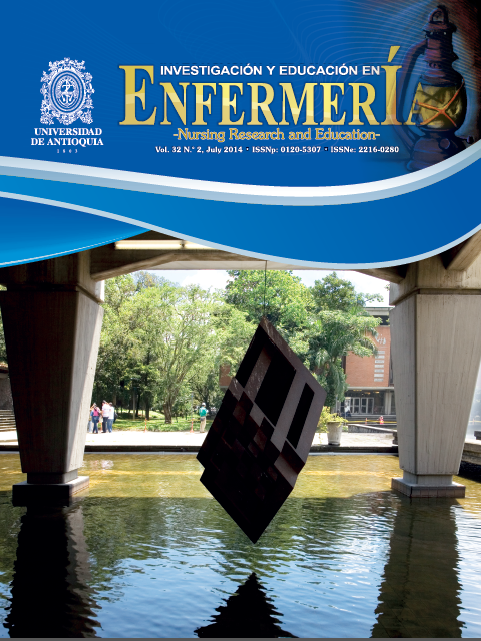Healthcare institutions do not favor care. Meaning of humanized care for people directly participating in it
DOI:
https://doi.org/10.17533/udea.iee.19949Keywords:
Nursing care, Humanization of assistance, health facilities, qualitative researchAbstract
Objective. This study sought to understand the meaning of humanized care for those directly participating in it.
Methodology. This was qualitative research with phenomenological interpretative approach conducted in Medellín, Colombia, during 2013. It included 16 participants among nurses, adult patients, and relatives. To gather the information, in-depth interviews were used; data analysis was performed manually according to the scheme proposed by Cohen, Kahn, and Stevees.
Results. According to the participants, institutions do not favor humanized care due to the inaccessibility of services whose possible causes are, among others, excessive procedural red tape, lack of resources, and long waits. Additionally, they state that nurses’ work overload keeps them away from the patients and prevents caring for them.
Conclusion. For the participants in the study, the humanized care practice of humanized care is affected negatively, on one side, by the service offered by healthcare institutions; and, on the other, by the influence exerted upon nurses, which conditions, in turn, how care is delivered.
Downloads
References
(1) Nodding N. Caring: a feminine approach to ethics and moral education. Los Angeles: University of California Press; 2003.
(2) Parsons T, Bales R, Shils E. Apuntes sobre la teoría de la acción. Buenos Aires: Amorrortu; 1970.
(3) Foucault M. El nacimiento de la clínica: una arqueología de la mirada médica. México D. F: Siglo XXI; 1991.
(4) Merhy EE. Saúde: a cartografia do trabalho vivo. São Paulo: Hucitec; 2002.
(5) Monticelli M, Elsen I. El hospital como una realidad clínica: una comprensión a partir del encuentro entre trabajadoras de enfermería y familias de un servicio de alojamiento conjunto. Horiz Enferm. 2004; 15(4):37-52.
(6) Gordon S. The new cartesianism. Dividing mind and body and thus disembodying care. En Nelson S, Gordon S. The complexities of care. Nursing reconsidered. Ithaca: IRL press; 2006. P.104-21.
(7) Watson J. The theory of human caring. Retrospective and prospective. Nurs Sci Q. 1997; 10(1):49–52.
(8) Watson J. Nursing: the philosophy and science of caring. Colorado: Colorado Associated University Press; 1985.
(9) Brusco A. Humanización de la asistencia al enfermo. Madrid: Centro de Humanización de la Salud; 1998.
(10) Echeverry ME. Derecho a la salud, estado y globalización. Rev Fac Nac Salud Pública. 2006; 24 (Especial):81-96.
(11) Travelbee J. Interpersonal Aspects of Nursing. Philadephia: Ed FA Davis; 1966.
(12) De la Cuesta C. Cuidado Artesanal. La invención ante la adversidad. Medellín: Editorial Universidad de Antioquia; 2004.
(13) Cohen M, Kahn D, Steeves R. Hermeneutic phenomenological research. A practical guide for nurse research. Londres: Saac Publications; 2000.
(14) Miles M, Huberman M. Qualitative data analysis. 2nd ed. Thousand Oaks: Sage; 1994.
(15) Hernández M. Bases morales de la reforma a la seguridad social en Colombia. Congreso Latinoamericano de Medicina Social. Buenos Aires; 17 a 21 de marzo 1997. Buenos Aires. Asociación Latinoamericana de Medicina Social; 1997.
(16) Echeverri ME. Las reformas estructurales en América Latina y el derecho a la salud. Rev Invest Soc. 2007; 3(5):43-66.
(17) Hernández M. El derecho a la salud en Colombia: obstáculos estructurales para su realización. Rev Salud Pública. 2000; 2(2):121-44.
(18) Borrero YE. Las reformas en el sector salud y los conflictos clasistas en Colombia: el caso de la ley 100/93 [Dissertation]. Cali: Universidad del Valle; 2008.
(19) Colliere F. Promover la vida. De las prácticas de las mujeres cuidadoras a los cuidados de enfermería. Madrid: Interamericana- Mc Graw-Hill; 1993.
(20) Weber M. Economía y sociedadad. México: Fondo de cultura económica; 1964.
(21) 21.Rodríguez A. Enfermería ante la deshumanización: una necesidad por ser considerada desde la filosofía de Emmanuel Levinas. Enferm Costa Rica. 2011; 32(1):37-42.
(22) Santos SR, Nóbrega ML. A busca da interação teoria e prática no sistema de informação em enfermagem: enfoque na teoria fundamentada nos dados. Rev Latinoam Enferm. 2004; 12(3):460-8.
(23) Henderson A, Van Eps MA, Pearson K, James K, Henderson P, Osborne Y. “Caring For” behaviors that indicate to patients that nurses “care about”. J Adv Nurs. 2007; 60(2):146-53.
(24) Forsyth S, MacKenzie H. A compartive analysis of contemporary nurses´discontents. J Adv Nurs. 2006; 56(2):209-16.
(25) De Almeida I, Paes M J. Cuidado humanizado de enfermagem: o agir com respeito em um hospital universitário. Rev Bras Enferm. 2007; 60(5):546-51.
(26) Santos TD, Aquino ACO, Chibante CLP, Espírito Santo FH. The nursing team and the family member accompanying adult patients in the hospital context. An exploratory study. Invest Educ Enferm. 2013; 31(2):218-25.
(27) Moreno M.E. Humanización del cuidado: una meta enraizada en la esencia de enfermería. Aquichan. 2013; 13(2):146-7.
(28) Gasull M. La ética del cuidar y la atención de enfermería. Barcelona: Universitat Oberta de Catalunya; 2005.
Published
How to Cite
Issue
Section
License
Derechos de propiedad / Direitos de Propriedade
English: If the article is accepted for publication, all copyright will be of exclusive property of Investigación y Educación en Enfermería. The text and the graphics included in the publication are exclusive responsibility of the authors and not necessarily reflect the thought of the Editorial Committee.
Español: Si el artículo es aprobado para publicación, todos los derechos son de propiedad de Investigación y Educación en Enfermería. El texto y las gráficas incluidas en la publicación son de exclusiva responsabilidad de los autores y no necesariamente refleja el pensamiento del Comité Editorial.
Português: Se o artigo for aceito para publicação, todos os direitos autorais serão de propriedade exclusiva de Investigación y Educación en Enfermería. O texto e os gráficos incluídos na publicação são de responsabilidade exclusiva dos autores e não refletem necessariamente o pensamento do Comitê Editorial.















